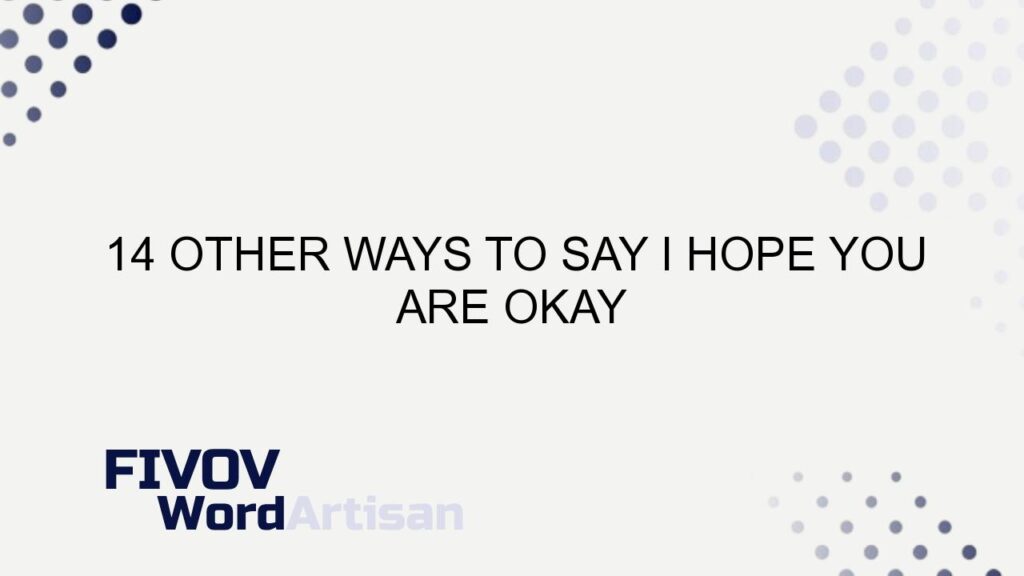Are you attempting to determine if something is feasible but find yourself needing to inquire first? Maybe you’re concerned that the phrase “I hope you are okay” might not be the most professional way to ascertain if an action can be undertaken.
MY LATEST VIDEOS
Well, you’ve come to the right place to find out more. This article will show you how to professionally convey the sentiment of “I hope you are okay” when you need it.
Other Ways to Convey “I Hope You Are Okay”
When expressing concern for someone’s well-being, there are various phrases and expressions you can use to convey the sentiment of “I hope you are okay” in different contexts. Here are 14 alternative ways to express this sentiment genuinely and professionally:
1. I trust all is well with you.
2. I’m sending my best wishes for your well-being.
3. I hope everything is going smoothly for you.
4. My thoughts are with you for a quick recovery.
5. I wish you good health and happiness.
6. I hope you’re feeling better soon.
7. You’re in my thoughts for a speedy recovery.
8. I trust that you’re doing well.
9. I hope all is well on your end.
10. Wishing you strength and comfort during this time.
11. Sending positive vibes your way.
12. Hoping for the best for you.
13. Trusting that you’re taking care of yourself.
14. I’m here for you if you need anything.
Each of these phrases can be tailored to fit the specific situation and relationship you have with the person you’re addressing, ensuring that your message comes across as sincere, caring, and professional.
Why It’s Important to Use the Right Words
The way we communicate our concern for others’ well-being is crucial. Using the right words can make a significant difference in how our messages are received. By choosing professional and genuine expressions, you can effectively convey your empathy and support for the person without sounding insincere or unprofessional.
Key Considerations When Choosing Alternative Phrases
When selecting alternative phrases to express “I hope you are okay,” consider the following:
1. Context: Tailor your message to the specific situation and the relationship you have with the individual. Use phrases that are suitable for the context in which you are expressing your concern.
2. Tone: Ensure that your chosen phrase reflects the appropriate tone for the level of concern or support you wish to convey. Avoid using overly casual or overly formal language if it doesn’t align with the nature of your relationship with the person.
3. Empathy: Choose phrases that genuinely convey empathy and care for the well-being of the individual. Your message should reflect your sincere concern for their comfort, health, or recovery, depending on the situation.
How to Incorporate Alternative Phrases in Different Situations
Let’s explore how you can use these alternative phrases in various situations where you want to convey your well-wishes and support:
1. In a Professional Setting: When communicating with colleagues, clients, or business partners, opt for phrases that are both professional and considerate. For example, “I trust all is well with you” is a subtle yet warm way to express concern in a professional context.
2. During a Personal Conversation: In more personal or informal settings, such as conversations with friends, family members, or acquaintances, you can use phrases like “Sending positive vibes your way” to convey your support in a less formal manner.
3. In a Formal Letter or Email: When writing a formal letter or email to show concern for someone’s well-being, phrases like “My thoughts are with you for a quick recovery” can be used to express empathy and support in a professional tone.
4. Through a Gesture of Support: Sometimes, actions speak louder than words. You can accompany your verbal message with a thoughtful gesture, such as sending a care package, offering assistance, or simply being there to listen, to reinforce your well-wishes.
Using Alternative Phrases in Different Languages and Cultures
It’s essential to consider the cultural and linguistic nuances when using alternative phrases to express concern for someone’s well-being, especially when interacting with individuals from diverse backgrounds. Some phrases may carry different connotations or levels of formality in different languages or cultures. When communicating with individuals from diverse backgrounds, take the time to understand how these phrases may be interpreted within their cultural context to ensure that your message is considerate and respectful.
Conclusion
Effectively conveying your well-wishes and concern for someone’s well-being is important in both personal and professional interactions. By using alternative phrases to express “I hope you are okay,” you can communicate genuine empathy and support in a professional manner. Remember to consider the context, tone, and cultural implications when choosing the right words to convey your concern, and always strive to be authentic and sincere in your expressions of support. Whether it’s in a professional setting, personal conversation, or formal communication, the words you choose can make a significant impact on how your message is received.
We hope these alternative phrases provide you with the right tools to express genuine care and concern for others in a professional and sincere manner. Remember, a thoughtful and caring message can brighten someone’s day and make a meaningful difference in their well-being.




